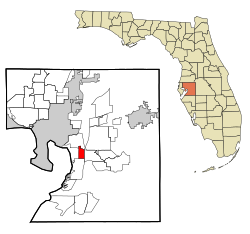2000 Census
As of the census [3] of 2000, there were 2,482 people, 853 households, and 622 families residing in the community. The population density was 737.4 inhabitants per square mile (284.7/km2). There were 905 housing units at an average density of 268.9 per square mile (103.8/km2). The racial makeup of the community was 6.69% White, 90.73% African American, 0.04% Native American, 0.12% Asian, 0.08% Pacific Islander, 1.09% from other races, and 1.25% from two or more races. Hispanic or Latino of any race were 2.74% of the population.
There were 853 households, out of which 28.5% had children under the age of 18 living with them, 37.9% were married couples living together, 28.1% had a female householder with no husband present, and 27.0% were non-families. 22.9% of all households were made up of individuals, and 11.5% had someone living alone who was 65 years of age or older. The average household size was 2.91 and the average family size was 3.41.
In the community the population was spread out, with 30.9% under the age of 18, 7.6% from 18 to 24, 23.3% from 25 to 44, 23.3% from 45 to 64, and 14.9% who were 65 years of age or older. The median age was 35 years. For every 100 females, there were 83.9 males. For every 100 females age 18 and over, there were 75.7 males.
The median income for a household in the community was $27,708, and the median income for a family was $32,384. Males had a median income of $24,440 versus $21,521 for females. The per capita income for the community was $11,781. About 15.1% of families and 18.4% of the population were below the poverty line, including 29.9% of those under age 18 and 14.8% of those age 65 or over.

